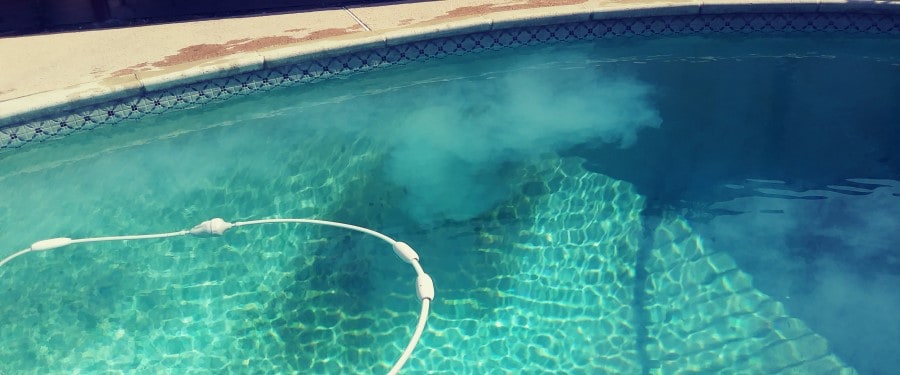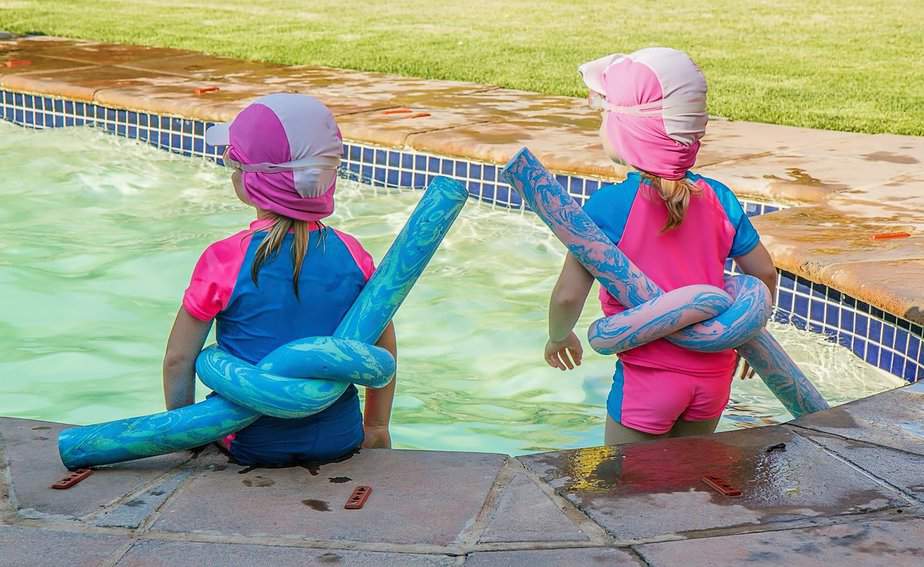Ahh…the smell of summer, flowers, iced tea, and a swimming pool that smells of chlorine! The majority of backyard and community swimming pools utilize some form of chlorine as the primary sanitizer. It stands to reason that they all would smell like chlorine… right? To a degree, there is some truth to that, but here I will cover some basic points on why your pools maybe underchlorinated if it smells like chlorine. Or to put it another way, why your pool may be under-sanitized if your smell strong chlorine odor. Doesn’t make any sense, right? Stay tuned…
This question was prompted recently by one of our service customers. He has a fiberglass spa that uses chlorine and he was trying to figure out why the chlorine smell was getting so strong. The customer called to ask if we could lessen the chlorine amount in the spa. This wasn’t my first call like this, so I like to use it as an opportunity to educate the client. When this happens, I like to test the water in front of the client so he can see for himself. Much to his surprise, the chlorine was in the acceptable range, even on the lower side. Spas are somewhat notorious for this because they are more concentrated than a larger body of water, so they are more susceptible to more extreme changes to water chemistry.
So, what was causing the odor? Let’s dig into the cause of a swimming pool or spa chlorine smell. I will cover two main concerns over strong chlorine smell.
- Is the chlorine smell coming from the chlorine, or something else?
- Should swimmers take a shower before getting into a swimming pool or spa?
Does Urine Cause a swimming pool to smell?
The age-old issue of bathers urinating in swimming pool or spa water is cause for concern for germaphobes the world over. Here’s the unsettling answer to the question of making the pool smell….YES. Yes, urine in swimming pool water will make the pool smell, but not how you may think. The smell that is produced is not the smell of urine, it’s what many identify as the smell of a pool with too much chlorine. Thankfully, a swimming pool with the right amount of chlorine can handle most of what any bather’s bladder can throw its way by way of sanitizing the urine. But there is another effect that human waste has on a pool or spa.
Why not use a urine reactive dye to dissuade people from peeing in the pool? Well mainly because it doesn’t exist. Check out this article I put together on pee detecting dye.

Human waste, whether urine, sweat, or even saliva contains ammonia. If the pH of the swimming pool water is not right and/or the level of the chlorine is too low, the ammonia waste will become combined with the chlorine and become a chloramine molecule. Because of this combination, even at very low levels chloramines will off-gas producing an obnoxious smell making swimming often unpleasant.
Whether in 100+ degree water or more moderate temperatures, the other waste we produce is sweat. Movement in the water, like any exercise, will cause us to sweat which also turns to ammonia. So, as I said at the outset, the chlorine-like smell is actually a product of under-chlorinating pool water.
Super-chlorinate to prevent or get rid of the chlorine smell in a swimming pool?
Chlorine has multiple functions, one mentioned earlier is to sanitize or rid the pool of germs, algae and such. The other is to oxidize or cause a chemical reaction effectively burning up other unwanted chemicals or molecules. Ammonia is one of those compounds that are unwanted, but unavoidable.
The only way to prevent that chlorine smell in the swimming pool is obviously to get rid of the cause of the smell in the first place. Unfortunately, if the DIY or professional pool tech is not aware or not treating the swimming pool water accordingly the ammonia can build up quickly. I have found that keeping the chlorine at about 2.0 ppm is not enough to effectively allow the chlorine to both sanitize and oxidize. You can try shocking the pool with a non-chlorine shock like this one from In The Swim on Amazon. It’s a pH neutral oxidizer shock treatment. If you are sensitive to chlorine or otherwise just don’t want to maintain a higher range like 4.0 ppm, you can achieve an ammonia-free pool using a super chlorination method. Some pros even recommend super chlorination on a monthly schedule. Here’s how to do it.
Test for combined chlorine, multiply that by 10 and the bring the free chlorine up to that level. Bring the chlorine residual up to 5 – 10 ppm for 4 hours. The best most effective way is to use liquid chlorine or granular non-stabilized chlorine at a dose of 3 – 6 times the amount you would normally add. Allow the chlorine to come back into safe range naturally so it can oxidize all the ammonia. Once it come back to the 2.0 – 4.0 ppm range, your chloramines should be gone as will the strong chlorine-like odors.
For a good overview of chemical balance and maintenance, check out this other article on maintenance.
Should Swimmers Shower Before Getting in a Swimming Pool
To prevent the need for frequent costly super chlorination, swimmers should pre-shower before swimming. This will remove excess oils, sweat and other contaminants from their skin, hair and bathing suits. This ultimately will reduce ammonia introduction and lessens the need or demand for chlorine.
And of course…do not pee in the pool!
Check out the next article to see where pool algae come from and how to manage it.
Do you find that you are going through a tone of chlorine during the summer months? Maybe your pool need sunscreen for your chlorine. Check out this article to find out.
Do you have a specific concern or question about pool maintenance? Leave a comment below, and we’ll try to get to it in a future article.
If you like our comment, join our email list to get notified when we post and get our newsletter.
Recent Posts
The Origin of Green Algae in Swimming Pools: Unveiling the Culprit
Swimming pools are synonymous with relaxation, fun, and refreshing dips during hot summer days. However, the appearance of green algae can turn this enjoyable experience into a frustrating one. Green...
At the heart of every pool is a filter pump that needs to be run every day for a specified length of time. Rather than try to remember to turn a pool pump on and off every day, pool builders and...


